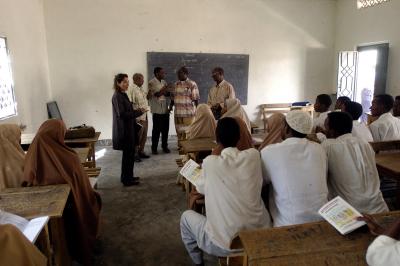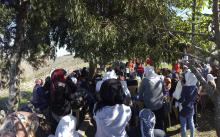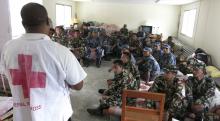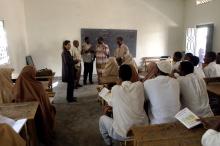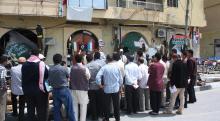Basic international humanitarian law (IHL) rules applicable to this situation:
Each party to the conflict must respect and ensure respect for IHL by its armed forces and other persons or groups acting in fact on its instructions, or under its direction or control.
Each State must make legal advisers available, when necessary, to advise military commanders at the appropriate level on the application of IHL.
States and parties to the conflict must instruct their armed forces in IHL.
States must encourage the teaching of IHL to the civilian population.
The case in brief
Decades of armed conflict and insecurity in Somalia have reinforced the importance of building respect for IHL among the country’s armed and security forces. The African Union Mission in Somalia (AMISOM) and the United Nationals Assistance Mission in Somalia (UNSOM) work together in support of the Somali government to rebuild Somalia’s security institutions and prepare its security forces to assume responsibility for national security upon AMISOM’s eventual withdrawal.
Between 2016 and 2018, AMISOM and UNSOM worked with partners to train Somali military personnel and police officers in IHL and international human rights law. The training was tailored to the Somali context and referred to traditions and religious teaching that can influence respect for the law.
IHL compliance highlights
- In 2014, 23 Somali military personnel participated in a train-the-trainer workshop designed to strengthen national capacity to promote IHL and international human rights law throughout the armed forces. Delivered by AMISOM and UNSOM with support from the African Center for the Constructive Resolution of Disputes (ACCORD), the workshop:
- enhanced trainees’ knowledge of IHL and international human rights law and their application to the Somali context, with reference to traditional Somali rules of warfare and commonalities between IHL and prevailing religious guidance
- prepared the trainees to train commanders responsible for military planning and joint operations with AMISOM.
- In 2017, UNSOM trained 63 military and Special Police Force officers from Somalia’ conflict-affected South West in IHL and international human rights law, better equipping them to perform their civilian protection duties effectively.
- In 2018, in the context of AMISOM training efforts, Somalia’s Chief of Defence Forces instructed his troops to comply with IHL when conducting military operations, warning that personnel who breached the rules would face prosecution.
Case prepared by Francesca Romana Ferrone, Joseph Gitata and Ana-Paula Ilg, LL.M. students at Roma Tre University under the supervision of Giulio Bartolini (IHL Professor), Tommaso Natoli (Research assistant), Alice Riccardi (Research assistant) and Laura Di Gianfrancesco (PhD student), Roma Tre University IHL Legal Clinic.
A. SOMALIA ARMY OFFICERS TRAINED ON INTERNATIONAL HUMANITARIAN LAW AND HUMAN RIGHTS
[Source: AMISOM, “Somalia army officers trained on international humanitarian law and human rights”, 28 August 2014, available at http://amisom-au.org/2014/09/somalia-army-officers-trained-on-international-humanitarian-law-and-human-rights/]
Kampala 28 August 2014 – The African Union Mission In Somalia (AMISOM) in conjunction with the United Nations Assistance Mission In Somalia (UNSOM) under the framework of the Joint Task Force on the Human Rights Due Diligence Policy (HRDDP) recently concluded a ten-day (19-28 August, 2014) Training of Trainers (ToT) workshop on International Humanitarian Law (IHL) and Human Rights for Officers of the Somalia National Army in Kampala, Uganda.
The 23 officers including five women benefited from the 10-day training course which incorporated a five-day refresher sessions on IHL and Human Rights and a five-day period of practical trainer sessions during which the participants were taken through course preparation and delivery of the various aspects of the provisions of the IHL and Human Rights in general and the specific aspects as they relate to the conflict in Somalia. Those trained were selected from a group of trainees who previously received similar training conducted in Djibouti in October 2012 and in Kampala, Uganda in August 2013.
Such trainings are at the heart of AMISOM’s strategic goals of building the capacity of the SNA [Somali National Army] and preparing them to take the lead in the defence of their country when AMISOM pulls out at the appropriate time. It is aimed at enhancing the respect for IHL and human rights in Somalia. In particular, it also provides a pool of trainers who can themselves deliver similar trainings and disseminate IHL and human rights to all cadres in the SNA at both basic and specialist levels of training.
Following this trainer of trainers, AMISOM will work closely with the United Nations Support Office for AMISOM (UNSOA) to provide the necessary logistical support to the Somalia Ministry of Defense including the renovation of training facilities and the provision of training equipment in order for these trainees to function effectively.
The workshop was supported by the African Center for the Constructive Resolution of Disputes (ACCORD) through its Norwegian funded – Training for Peace (TfP) project under the auspices of the Memorandum of Understanding (MOU) between AMISOM and ACCORD.
B. TRAINING OF TRAINERS IN INTERNATIONAL HUMANITARIAN LAW FOR SOMALI NATIONAL ARMY OFFICERS
[Source: ACCORD, “Training of Trainers in international humanitarian law for Somali national army officers”, 11 September 2014, available at http://www.accord.org.za/news/training-of-trainers-in-international-humanitarian-law-for-somali-national-army-officers/]
The ToT [Training of Trainers] training followed two previous basic courses on IHL conducted in Djibouti of 2012 and 2013 organised by AMISOM and ACCORD [African Center for the Constructive Resolution of Disputes]. The trained SNA officers hold direct responsibility in training of the SNA [Somali National Army] and commanders whose duties include military planning and execution of the joint operations with AMISOM. In addition, the SNA Officers support the logistical needs for the Ministry of Defence, including the provision of training equipment.
The training contributed to building competent and professional SNA trainers who after being equipped with knowledge of IHL and IHRL will in turn be able to disseminate and provide training in the basic rules of IHL and IHRL applicable in the context of armed conflict in Somalia. The training involved general introduction to Somali customary rules of warfare “biri-ma-geydo; Islam and IHL; rules on protection of victims – Common Article 3 to the Geneva Conventions; rules on the conduct of hostilities; protection of detainees; protection of civilians and gender in the context of IHL – specific protection afforded to women under IHL; protection of humanitarian relief personnel and objects; protection of children during armed conflict; displacement and protection of persons displaced by armed conflict; the implementation of the concepts; and case studies specific to the context of Somalia.
[…]
C. TRAINING OF THE SOMALI NATIONAL ARMY IN COOPERATION WITH UNSOM
[Source: UNSOM, “UN trains South West security forces on human rights and international humanitarian law”, 25 September 2017, available at https://unsom.unmissions.org/un-trains-south-west-security-forces-human-rights-and-international-humanitarian-law]
Baidoa - The UN is conducting a two-week course on human rights and international humanitarian law for 63 officers from the Somali National Army (SNA) and the South West Special Police Force.
The training, which started last week in Baidoa, South West state’s administrative capital, is aimed at equipping security forces drawn from Bay, Bakool and Lower Shabelle regions with skills on human rights and humanitarian law.
The Human Rights and Protection Group of the United Nations Assistance Mission in Somalia (UNSOM) is conducting the training as part of the Mission’s mandate to support the rebuilding of Somalia’s security institutions.
UNSOM’s support to the security sector is aimed at professionalizing security institutions and developing their capacity to protect citizens.
“The purpose of the training is to provide the state forces with knowledge on human rights issues and strengthen the rule of law,” explained Nadifa Armey Abdullahi, the South West state Minister of Women and Human Rights, during the opening of the training session for the South West Special Police Force Officers. “It will enable security forces to have a good understanding of human rights since they are dealing with different sections of the society”.
Through the training, participants get a better understanding of their complex roles and duties in the protection of civilians, vulnerable and marginalized individuals and groups, among them women and children.
Charles Muwunga Mwebe, UNSOM Human Rights Team Leader in Baidoa, commended the active participation during the sessions. “They are raising a lot of issues because this is something that is practical and key to their lives,” Muwunga said.
[…] “This is not the first time we are given such training and it will certainly make difference in the conduct of the military towards civilians,” stated Abdullahi Noor Ali, an SNA trainee.
Foos Abdi Farah, another SNA trainee said the training would be beneficial to both the Somali National Army and the civilian population. “We request for more trainings so as to get more knowledge,” Foos added.
At the end of the training, participants will be expected to demonstrate the ability to transfer the knowledge acquired to their counterparts in the army and the police force.
D. JOINT COOPERATION OF SOMALI NATIONAL ARMY AND AMISOM IN TRAINING ACTIVITIES
[Source: AMISOM, “Somalia’s army asked to comply with International Humanitarian Law during military operations”, 13 August 2018, available at http://amisom-au.org/2018/08/somalias-army-asked-to-comply-with-international-humanitarian-law-during-military-operations/]
Mogadishu, 13 August 2018 – The Chief of Defence Forces (CDF) of the Somali National Army (SNA), Maj. Gen. Abdiweli Jama Hussein ‘Gorod’, has instructed his troops to ensure compliance with the International Humanitarian Law, when conducting military operations in the country.
The CDF warned that soldiers who disregard the law will be prosecuted. He also distributed the “Code of Conduct for Combatants’ to the local army to familiarize them with combat rules, which guides on how to protect civilians and their property, limit destruction and respect civilian property during combat, among other rules.
[…]
“When you want to maintain security and you are fighting insurgents (Al-Shabaab), there are international laws to be observed which must to be [sic] safeguarded,” Gen. Abdiweli cautioned the soldiers. “The religion of Islam ordains that. The people you are protecting, those you are fighting with and those you are fighting for should be very clear to you.”
[…] AMISOM is spearheading training of the Somali National Security Forces on International Humanitarian Law and Human Rights.
[…]
Dr. Omar noted, that the briefing was part of a series of trainings being offered by AMISOM to the SNA officers, to improve their knowledge on human rights issues and ensure compliance with the International Humanitarian Law.
“Somalia is state party to international conventions; is state party to the Geneva Convention and they have an obligation to respect and ensure respect for International humanitarian law governing the conduct of warfare,” said Dr. Omar.
He observed that the joint nature of operations between AMISOM and the SNA has compelled the AU Mission to conduct a series of trainings for the army, to create awareness and ensure compliance.
On his part, Maj. Gen. Abdiweli hailed the collaboration between the SNA and AMISOM, which he noted had allowed for joint planning. He expressed optimism about efforts being undertaken to build the capacity of the SNA to take charge of the country’s security.
“When you want to achieve something, you have to plan and prepare and then you execute the plan and this is part of those efforts,” Gen. Abdiweli remarked.
Discussion
I. Classification of the Conflict and Applicable Law
1. How would you classify the situation in Somalia? Was there an armed conflict? If yes, who were the parties to the conflict? What additional information would you require in order to make such a determination? Is AMISOM bound by IHL? (GC I-IV, Art. 3)
II. Dissemination of IHL
2. Are Parties to the conflict obliged to disseminate IHL to their armed forces? What does the obligation to disseminate IHL imply? Does the obligation to disseminate IHL apply only during an armed conflict or also in peacetime? (GC I-IV, Art. 1; GC I, Art. 47; GC II, Art. 48; GC III, Art. 127; GCI V, Art. 144; P I, Art. 83; P II, Art. 19; CIHL, Rule 142)
3. What challenges can be present? Are peace support operations, such as AMISOM, under the same legal obligation to respect and disseminate IHL as States? Are Troop Contributing Countries required to guarantee the dissemination of IHL in case of deployment of their troops in peace support operations? (GC I-IV, Art. 1; GC I, Art. 47; GC II, Art. 48; GC III, Art. 127; GCI V, Art. 144; P I, Art. 83; P II, Art. 19; CIHL, Rule 142)
4. What is the role of legal advisers in armed conflicts? (P I, Art. 82, 83 (Para 2) and 87; CIHL Rule 141)
III. Elements Contributing to Respect for IHL
5. (Documents A, C and D) Can IHL trainings be in line with the military interests of armed forces? Can it be a mean to ensure ‘building capacity’ of the armed forces? Does familiarity with IHL rules contribute to further respect of IHL within the armed forces?
6. (Documents A and D) Can the implementation of IHL by the armed forces of the host state facilitate the mandate and activities of multinational peace support operations, as the one deployed in Somalia? How?
7. (Documents A, B, C, D) What is the role and added value of NGOs and other organizations and external actors to promote such activities? What can be the added value of having joint planning trainings?
8. (Documents B and D) Why do you think sessions were also devoted to Somali traditional customs of warfare, Sharia Law and IHL? Can traditions and religion play a positive role in ensuring respect for the law?
9. (Document C) Does the active participation of the trainees in the sessions showcase a keen interest in the armed forces to follow and implement IHL? What do you think about the following statement: “We request for more trainings so as to get more knowledge”? Does it show that communicating about IHL is essential to ensure respect?
10. (Document D) What is the importance of statements by the defense minister to promote the dissemination and implementation of IHL and IHRL? Do you think it might pressure the parties to the conflict to respect IHL?

